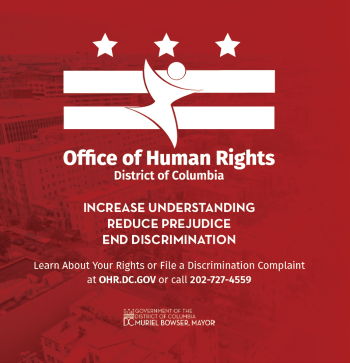Sections on this Page:
- What Is the DC Office of Human Rights?
- Who Does OHR Protect?
- Filing a Claim of Discrimination and Complaint Forms
- Language Access Program
- Creating Safer Spaces
- Youth Bullying Prevention
- Domestic Workers Protections in Employment
- Outreach and Education
- How to Contact Us and Customer Conduct
What Is the DC Office of Human Rights?
The DC Office of Human Rights (OHR) is a DC government agency that investigates, mediates, and adjudicates, complaints of discrimination. Additionally, OHR works to prevent discrimination through outreach and awareness campaigns. If you believe you have been discriminated against in DC in the areas of employment, housing, public accommodations/government services, or educational institutions, you can file a complaint with our office at no cost. If probable cause is found, the case will be certified for a full hearing on the merits to see whether there has been a violation of the law. If discrimination is found, monetary or other damages may be awarded. Throughout the process, OHR offers various mediation and conciliation opportunities.
If you would like to learn more about the case processing system, we offer a downloadable case system diagram.
Who Does OHR Protect?
Whether you’re a resident, commuter, or visitor to DC, the DC Human Rights Act (DCHRA) protects you from discrimination based on 23 protected traits (with some exceptions). The DCHRA prohibits discrimination based on the following protected traits in educational institutions, employment, housing and places of public accommodation and government services.
Filing a Claim of Discrimination and Complaint Forms
If you believe you were discriminated against because of a protected trait or have knowledge of a violation of the laws OHR enforces, you can file a complaint with our office. Complete one of the complaint questionnaires online or visit us in person at the DC Office of Human Rights, 441 4th Street NW, Suite 570N, Washington, DC 20010.
Language Access Program
OHR is also home to the Language Access Program, which exists to ensure that District of Columbia residents with limited or no English proficiency (identified as LEP/NEP) are provided equal access to information and services provided by the city. Residents who speak limited English must be offered interpretation services or translated documents when requesting government services, as required by the DC Language Access Act of 2004. OHR’s Language Access Program staff conduct extensive outreach, provide training and technical support to District of Columbia funded entities that serve LEP/NEP residents, and measure the effectiveness of their service to these groups by annually evaluating their level of compliance. .
You can learn more and file a claim by visiting the Language Access Program support page in English, Amharic, Chinese, French, Korean, Spanish, and Vietnamese.
For further questions, please send them to: [email protected]
Creating Safer Spaces
Our Creating Safer Spaces Unit works to secure compliance in two specific areas: (1) sexual harassment prevention training in the tipped wage industry, as mandated under the Tipped Wage Workers Fairness Amendment Act of 2018 (TWWFA); and (2) non-discrimination training sessions for seniors living with HIV and LGBTQ+ seniors in long term care, as mandated under the Care for LGBTQ Seniors and Seniors with HIV Amendment Act of 2020. Our work in these areas includes providing education through factsheets and raising awareness through outreach interventions. By creating safe spaces, we eradicate discrimination, increase equal opportunity, and protect human rights of those who live, work, and visit the District of Columbia.
For additional questions regarding either compliance program, please contact:
- Tipped Wage Workers Sexual Harassment Prevention Training: [email protected]
- Non-Discrimination Training Session for Seniors living with HIV and LGBTQ+ Seniors in Long Term Care: [email protected]
Youth Bullying Prevention Program
Our Citywide Youth Bullying Prevention Program assists youth-serving government agencies, grantees, and schools with implementing effective bullying prevention policies in compliance with law. Our approach discourages an overreliance on discipline and instead adopts a public health approach focused on prevention, supporting at-risk youth, and addressing incidents to change behavior.
For further questions or concerns, please send them to [email protected].
Domestic Worker Protections in Employment
For decades, domestic workers were not protected from employment discrimination under the DC Human Rights Act (DCHRA) because domestic workers were excluded from the definition of “employees” within the law. Now, the DCHRA has been changed to include domestic workers within that definition of employee. This means that if you are a domestic worker, you have the same employment protections as other employees. Therefore, it is illegal to harass you or discriminate against you at work based on one or more of the 18 employment-protected traits under the DCHRA, and it is illegal to retaliate against you for complaining about illegal harassment or discrimination.
Outreach and Education
Presentations are flexible in duration, ranging from brief five-minute sessions to more detailed hour-long discussions, and can include a Q&A segment. Attendees are encouraged to file a complaint if they believe they have been discriminated against and to share the information with others in their community.
To request a presentation at an upcoming event or meeting, please contact OHR at [email protected]
How to Contact Us and Customer Conduct
If you have any further questions please contact us via:
- E-mail: [email protected]
- In-Person: 441 4th Street NW, Suite 570N, Washington, DC 20001
- Phone: (202) 727-4559



